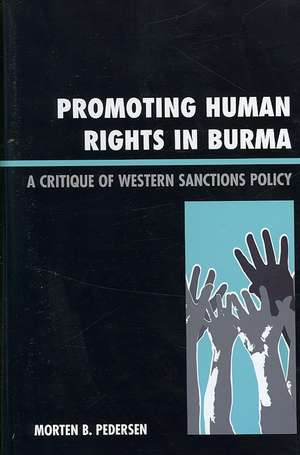Promoting Human Rights in Burma
Autor Morten B. Pedersenen Limba Engleză Hardback – 24 aug 2007
Preț: 733.53 lei
Preț vechi: 1004.84 lei
-27% Nou
Puncte Express: 1100
Preț estimativ în valută:
140.38€ • 146.02$ • 115.89£
140.38€ • 146.02$ • 115.89£
Carte tipărită la comandă
Livrare economică 15-29 aprilie
Preluare comenzi: 021 569.72.76
Specificații
ISBN-13: 9780742555594
ISBN-10: 0742555593
Pagini: 297
Dimensiuni: 163 x 236 x 29 mm
Greutate: 0.6 kg
Editura: Rowman & Littlefield
ISBN-10: 0742555593
Pagini: 297
Dimensiuni: 163 x 236 x 29 mm
Greutate: 0.6 kg
Editura: Rowman & Littlefield
Notă biografică
By Morten B. Pedersen - Foreword by Thant Myint-U
Descriere
Since 1988, when Burma's military rulers crushed a popular uprising, Western governments have promoted democracy as a panacea for the country's manifold development problems. This book puts forward an argument that Western democracy rhetoric has not supplied the solution to these problems. It proposes an alternative model of critical engagement.
